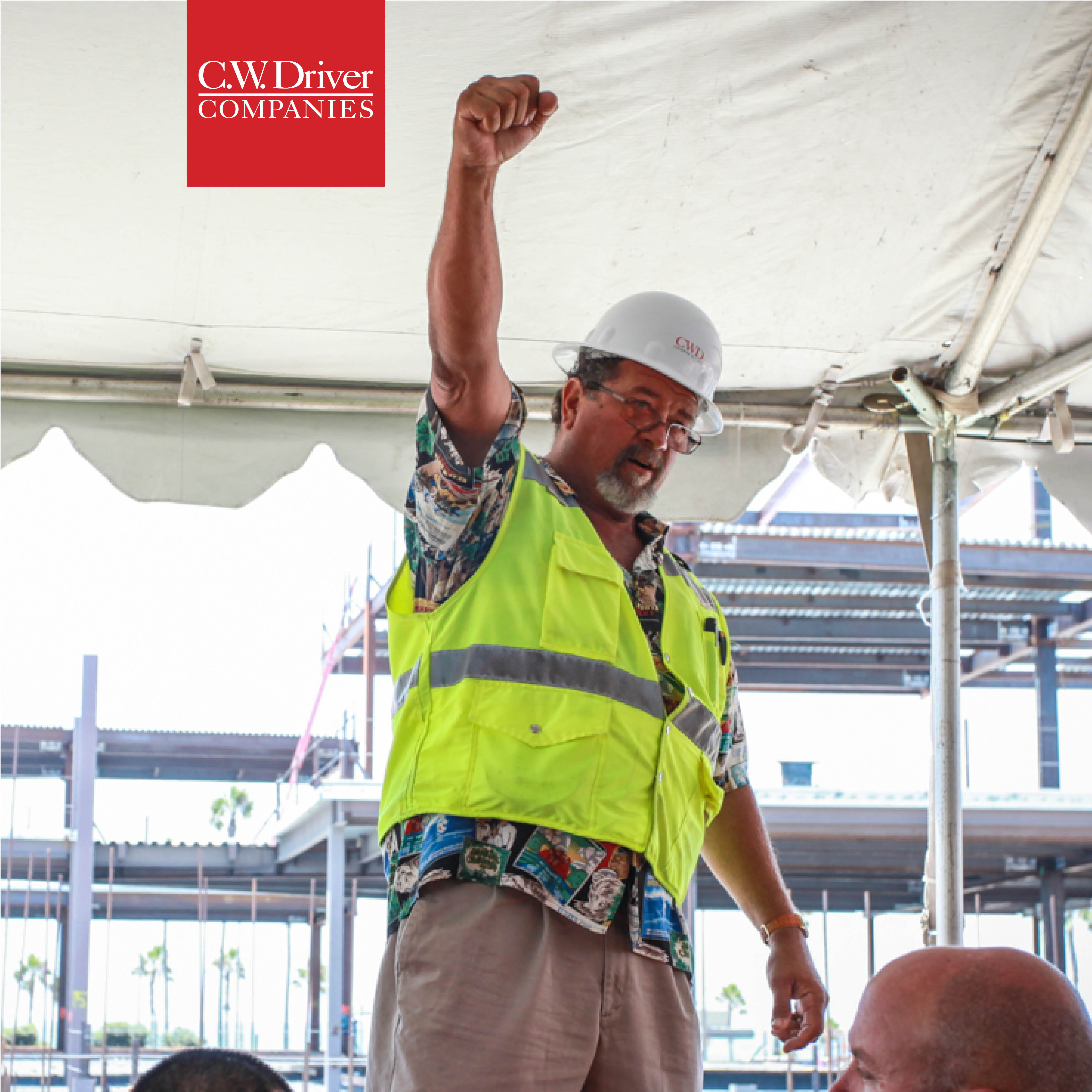Leo O’Brien, Senior Superintendent, has been with C.W. Driver Companies for 10 years working primarily on large, landmark projects. Leo is currently wrapping up the Hillsdale Shopping Center North Block Reconfiguration project, the largest retail project in the company’s history.
What has been the most challenging part of the Hillsdale Shopping Center North Block Reconfiguration project? How did you overcome this?
The Hillsdale Shopping Center North Block Reconfiguration includes 291,519 SF of retail, dining and entertainment space centered around an outdoor plaza. The design for the mall redevelopment requires the installation of intricate metal wall panels on almost every building’s exterior. The Hillsdale Shopping Center is not a simple rectangular box. Each building structure is unique with various recesses and steps, making installation of the metal panel systems even more complex. Each building was completely framed and waterproofed before the parts could be measured and manufacturing could begin. Tolerances in metal stud framing were tight, so a quarter of an inch here or there had a significant effect on the success of the construction. Challenges in these areas were not only time-consuming and expensive to solve, but were critical to the project’s success. Our team’s proactive approach helped mitigate problems involving the exterior panels, in order to ensure proper installation and a quality product. In the end, all joints were uniform and installation went smoothly. The shopping center stands out as an architectural beauty that will last decades.
What do you think are the keys to a successful project?
There are many keys to making a project successful. It is important to collaborate and communicate with every member of the project team as early as possible. When a project has well developed plans and specs, we are able to provide accurate estimating and perform a thorough constructability review. From this information, we can develop a project strategic plan that will get the entire project team, including the owner and architect, on the same page. Adequate and appropriate staffing, coupled with an aggressive but realistic schedule, will lay the groundwork for a timely contract award and material procurement in compliance with the demands of the schedule. Preconstruction meetings with the subcontractors are essential to the validation of our assumptions and will inspire their buy-in and commitment to our goals. A logical and efficient site logistics plan is very important to the flow of work. Careful attention to budget, safety, and quality will ensure our success. C.W. Driver takes pride in adhering to our core values—Teamwork, Respect, Integrity, Commitment, Loyalty, and Excellence—in every step of the construction process.
What’s the biggest change you have seen in the construction industry?
The construction industry is much safer and more efficient than it was 30 to 40 years ago. Safety training, technology, and workplace practices have improved dramatically. Technological advances have streamlined the processing of data and enabled instant access to information. Having all the contract documents available on an iPad has greatly enhanced the way we plan and communicate with the project team.
Technology has dramatically improved our efficiency and accuracy, but I still believe that keeping some traditional elements, like printed plans for overall site logistical planning and management, is essential to a successful project. I have noticed the negative effects that social media platforms can have a project team’s efficiency. The need to be constantly connected has diverted valuable time and attention from the tasks at hand that the workforce must accomplish.
The range of building materials has grown exponentially as well. While these advances have improved the quality of the final product, the development of more sophisticated building envelope systems has complicated the relationship and timing between exterior skin and site improvements. Green building/LEED requirements have also changed the way we build to a great extent.
What do you hope never changes?
Regardless of how technology has improved our lives both at work and at home, I hope builders are never replaced by artificial intelligence, robotics, and assembly lines. People are what makes this industry so great. We are fortunate to work in an industry that allows us to enjoy the tangible evidence of our hard work and expertise. I hope that no matter how sophisticated technology gets, the human element of building never goes away.
Adaptability is necessary to succeed in this industry. How did you learn to embrace uncertainty?
As my career has progressed, I have learned to adapt to any challenge that is thrown my way. One thing is certain: There will always be change. While managing a construction project, you come to realize the majority of your day is spent assessing and mitigating risks. If a component of a body of work is not accounted for and available when needed, it can delay the flow of work on the critical path. You must be prepared to utilize work-around plans to remain productive despite whatever changes may occur.
Adaptability cannot be taught in school. It is a skill that is learned through experience out in the field. I have learned to draw on my knowledge and expertise to come up with the best workaround plans possible. It is important to work together with the project team to establish an alternative course of action, while still maintaining the critical path and goals of the project. After many years in the industry, I have learned to be resilient and resourceful.
Closing thoughts?
It is an honor and privilege to be a member of the C.W. Driver team. This team is the best group of people I have ever had the pleasure of working alongside. When I first started with the company, I was very impressed and humbled by the knowledge and experience of the superintendents in the company. It is vital that industry veterans and the younger generations learn from each other. In an age where newer superintendents and veterans of the industry are in transition, we need to remember that both sides have something to learn from the other. Operate within the guidelines of your core values, and we will enjoy great success for years to come.


